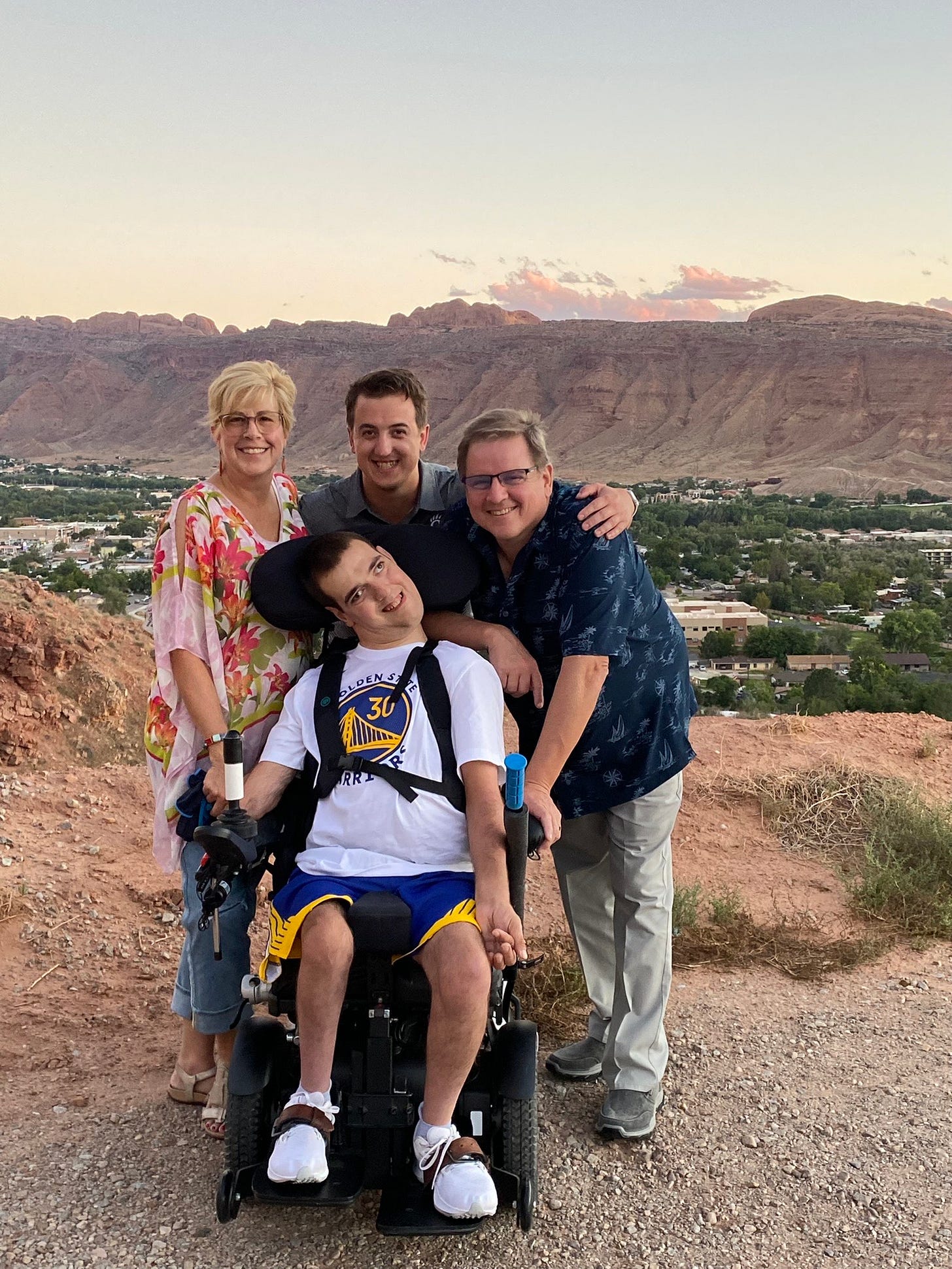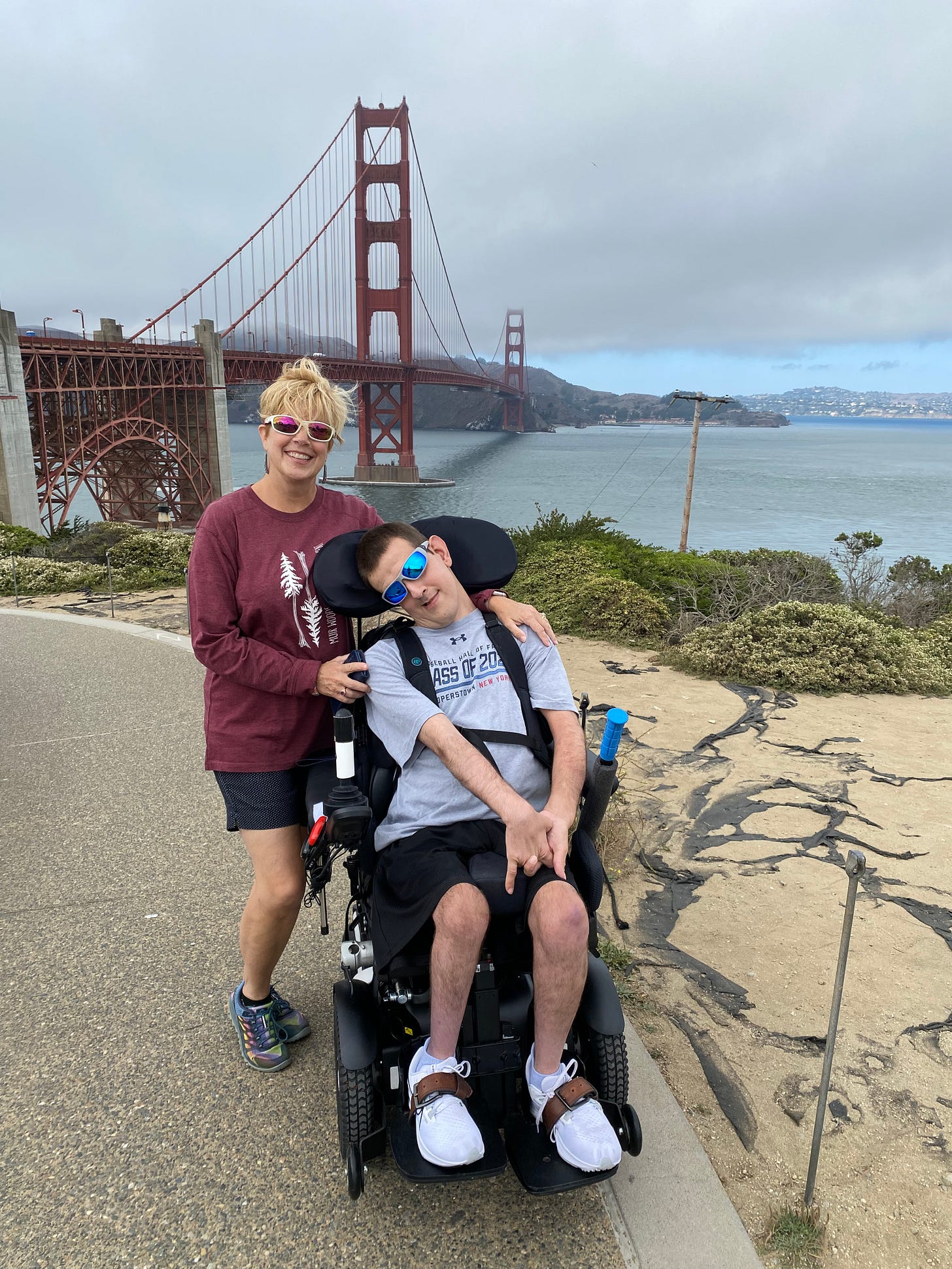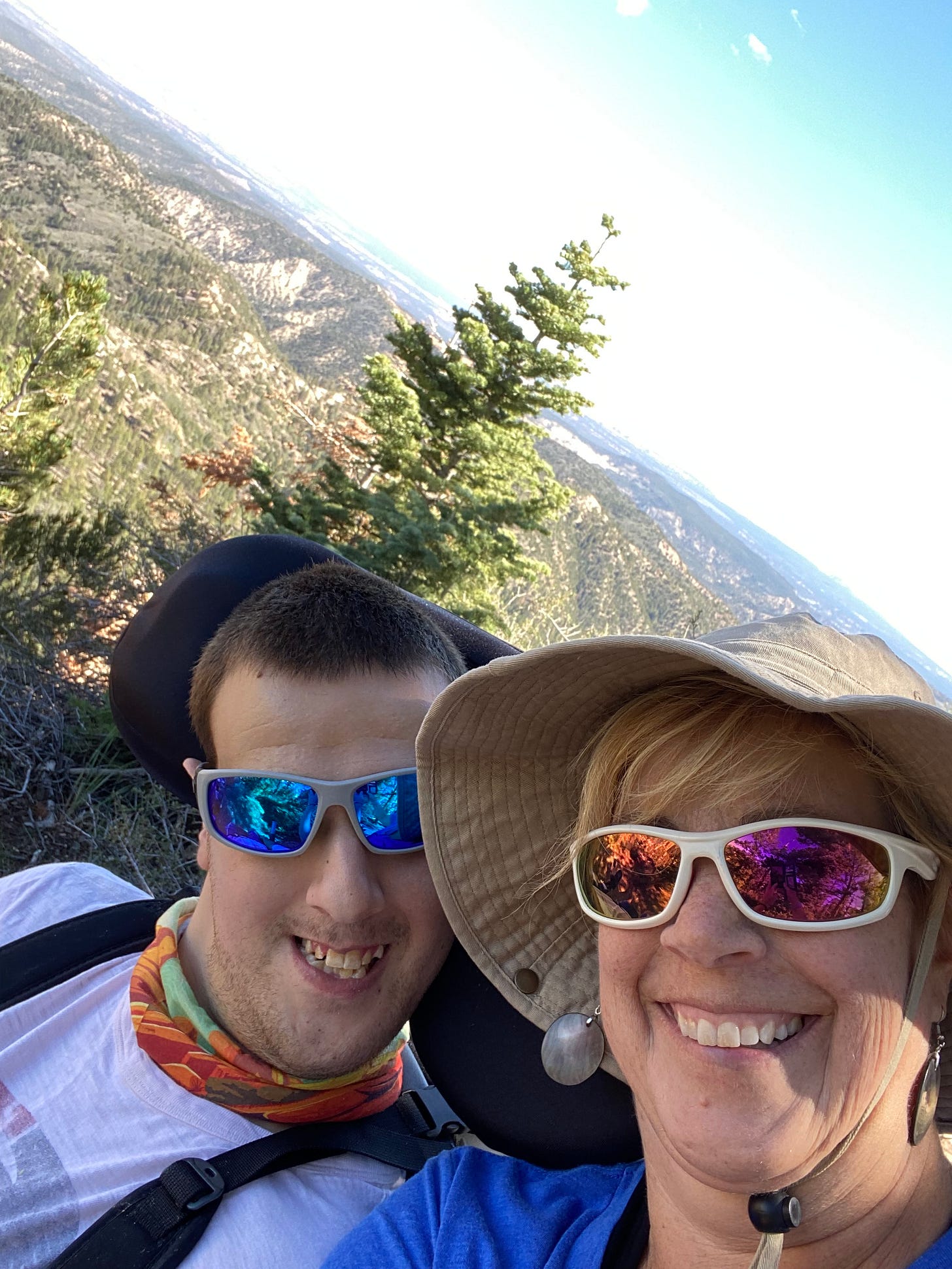Spotlight Interview
"It’s very important to reach out, invite others in, and welcome new friends and ideas. It may be the secret to life, actually."
Amy Clawson is my friend, a fellow “special needs parent,” and a professional Family Support Specialist helping families with disability-related challenges navigate healthcare, Medicaid, education, and other systems in her home state of Ohio. She is compassionate, courageous and committed — and eagerly shares her story to help others with their journey.
In this 93rd volume of Another Normal, I’m pleased to share a special guest interview with Amy about her amazing life and family. Her powerful reflections will be helpful to readers everywhere who want to learn to bloom.
What can you tell us about your son, Tim, and the rest of your family?
Tim is a bright, funny, 26-year-old young man who happens to have Cerebral Palsy (CP). He’s passionate about football and dinosaurs. And he makes a huge impact on just about everyone he meets. Tim drives his own power wheelchair and controls a communication device with his joystick. He lives at home with my husband, Paul, and me. Our other son, Ben lives four hours away with his fiancée. They and my parents provide lots of support by phone and occasional visits. Our good family friend, Rose, is like a sister to me and has had a unique bond with Tim since preschool. I couldn’t have made it this far without her.
How do you manage Tim’s caregiving needs?
Due to a severe labor shortage of home health aides in Ohio, Paul and I continue to serve as Tim’s primary caregivers. We are very fortunate to have two personal care attendants (PCAs) who help Tim with his daily needs. They also take him out to social and sports events, which is very important to him. I’m so glad we involved professional caregivers early in Tim’s life. It made things a little less daunting when Paul and I encountered our own recent medical challenges.
Can you say more about this?
Just as Covid began, my husband was diagnosed with leukemia. We spent two years dealing with chemotherapy, a stem cell transplant and lots of terrifying uncertainty. Also at this time, I was diagnosed with a rare blood disorder that requires lifetime maintenance and attention. Thankfully, Paul is now two years cancer-free. Through this experience, we have achieved a new outlook on what’s important to us individually and to our future as a family.
How has your perspective changed?
I’ve calmed down significantly. I still work hard to find new, better things for Tim; but I also make more time to “stop and smell the flowers.” I also make special time for Ben, now more than ever. I’m teaching myself to worry less about the small stuff, to focus on Paul, and to do the things we love like playing with our dogs, hiking and kayaking with friends. It feels good to make ourselves a priority finally.
What do you think you’ve done well over the years?
I worked hard to build networks and friendships with our supporters. This was driven by my own need to help our kids, so I reached out to lots of people — especially when we faced challenges. Thankfully, many of these people are still in contact with us, albeit some from a long distance. They make Tim’s life richer, and mine as well.
Tim has always been adventurous like me, so I’ve made travel a priority for us over the years. We’ve driven all over the country to see new things, and I love how surprised people are to hear about our adventures in New York City, Moab, Boston, California and elsewhere. No matter how hard it might be, it’s always worth the effort. We’ve made great memories and had so much fun.
What do you wish you’d done differently?
I regret that I didn’t let some family members into our lives more. When Tim was young, I didn’t have enough time or energy to explain things because he needed so much. I probably came across as rude or disrespectful, when really I was just trying to get by. I also regret that his sibling was often left waiting in the wings while I chased treatments, programs and services for Tim. I was constantly advocating, but also running out of steam. I’m fortunate that Ben is now a patient, pleasant and personable adult and we spend quality time together. I just wish we’d had more of that throughout his childhood.
What other challenges stand out for you?
Managing my mental health continues to require a lot of energy. We didn’t talk about it when I was a child, but I know I had depression. When Tim was born, I was suicidal and didn’t get out of bed for days. When Paul was diagnosed with cancer, I struggled again. With every trauma, I’ve clawed myself out and found the professional help I needed. In the NICU, Tim’s nurses encouraged me to share my story so others can learn from my experiences. Good therapists have helped me acknowledge my grief and fears and figure out what to do with my feelings. Unfortunately, they’re more common than most people realize.
I think hospitals are better now at supporting parents and families than they were when Tim was born. But we still need to improve. Many moms become manic. Others completely withdraw. Neither is good for the parent or family. We really must push mental health support to reduce the stigma.
It’s also important to mention that I had to quit my accounting job when Tim was born because no one else could provide the full-time care he requires. Poor Paul really struggled then and suffered some career and financial setbacks as a result. Our first ten years of parenting were very tumultuous, but we never gave up on each other or our kids, which makes me really proud.
What scares you the most about the future?
Looking ahead, I worry that I can’t take care of Tim forever. I want to delegate, but I fear that others will not be as proactive in his daily care or just as good as I am. The day is coming when he’ll move into his own space, but we don’t know what that looks like yet. He has so many gifts, and I want him to be in an environment where these are appreciated. As you might imagine, I continue to network for solutions.
I’m also scared for others in society who aren’t as lucky as us. I have a husband and partner, am financially stable, and have a supportive community to lift me up and help me when I need it most. Sadly, many people in Ohio and elsewhere don’t enjoy these privileges. I see it everyday in the work that I do as a Family Support Specialist. The lack of diversity in our healthcare and social service systems makes everything even harder for many people. It’s a systemic problem that must change or more individuals will fall through the cracks, despite whatever promise and abilities they possess.
What gives you hope?
I’m very hopeful that Tim can live a happy, healthy life with and without us as he ages. I’m hopeful that Medicaid HCBS will remain strong and well-funded, so the financial burden of his care is not a major concern. And I’m hopeful that Ben and his wife will maintain their close relationship with Tim and support him throughout adulthood. Our family’s resilience gives me great hope. Paul and I have worked hard to give Tim and Ben good, happy lives — and I’m proud of what they’ve accomplished and what our family has overcome.
Advances in technology also give me hope. Families today have so many good tools, like the internet, smart phones, online support groups and virtual coaching and counseling, just to name a few. The resources are there if we can just find the time and energy to access them.
What advice do you have for other parents?
I would encourage other parents to open themselves up to connections and to look for the helpers. You are not alone. It’s very important to reach out, invite others in, and welcome new friends and ideas. It may be the secret to life, actually.
Another Normal is an e-newsletter for parents, caregivers, educators and others committed to helping young adults with disabilities bloom and grow. If this copy was forwarded to you, please sign-up for your own copy below. Leave a comment about what you’ve read or want to know more about. Thank you for being here.






Amy is a rock star! Proud to call her a colleague and friend...
Amy, thank you for sharing your journey in such an honest and compelling manner. You spoke to so many truths that we live with. Thank you.